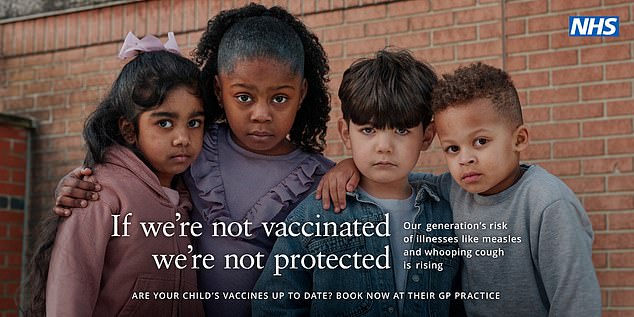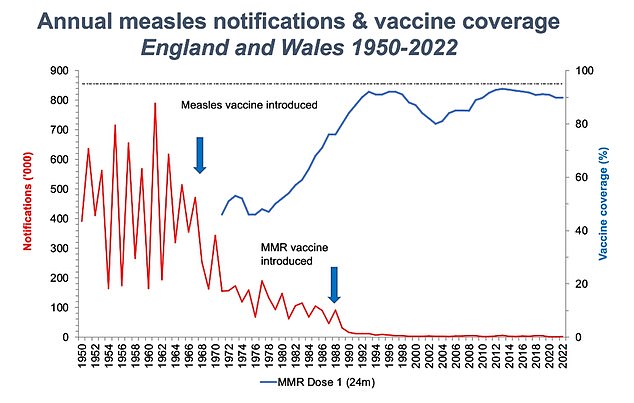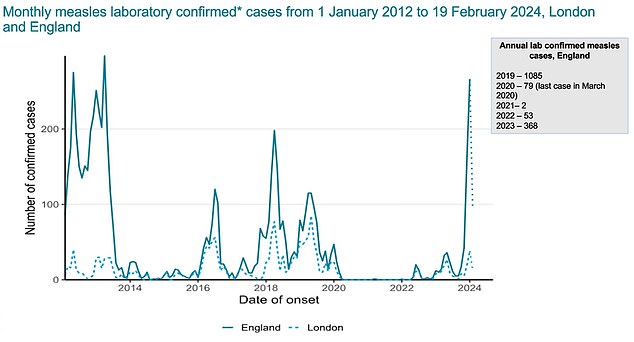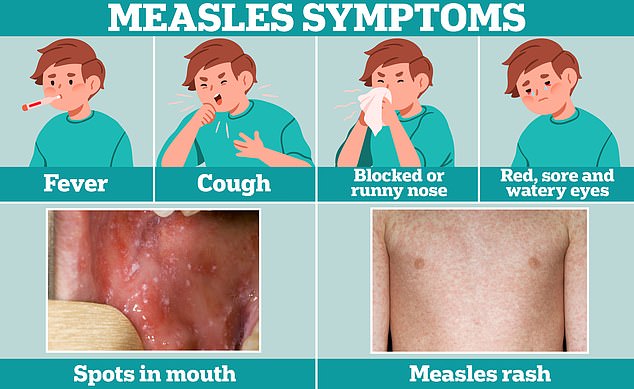“If we are not vaccinated, we are not protected” is the compelling central message of a new childhood vaccination campaign.
Spearheaded by children, the ad aims to appeal directly to parents and increase the number of vaccinations for their children.
Uptake of the range of injections offered to young people had been declining and dropped significantly during Covid.
The 20-second clip shows children asking their parents if their vaccines are up to date, and the young people say, “We could become seriously ill, risking lifelong disabilities,” if we are not protected.
“Our generation’s risk of contracting diseases like measles and whooping cough is increasing,” they tell their parents and caregivers, looking directly into the camera.

‘If we are not vaccinated, we are not protected’ is the compelling message at the center of a new NHS children’s vaccination campaign
Your browser does not support iframes.
Experts said the children’s voices “resonated” with parents, adding that they hoped they would serve as a reminder to people in their “busy lives.”
The routine childhood immunization program in England offers protection against 13 diseases, including measles, polio, diphtheria, mumps, whooping cough, rubella and meningococcal infections, which can lead to meningitis.
UKHSA consultant epidemiologist Dr Vanessa Saliba said there had been a decline in vaccine uptake over the past decade, which had been “exacerbated” since the Covid-19 pandemic.
She said: “We are not meeting the World Health Organization targets of 95 per cent acceptance of these vaccines and this is important because if we do not meet those targets, we will not have those levels of immunity in the population, we will have “We see that cases and outbreaks occur and that children get sick, are hospitalized and suffer unnecessarily because these are all preventable infections.
Ruairidh Villar, head of campaigns at UKHSA, said vaccines have “almost become victims of their own success”, with most people having little direct knowledge of the “terrible childhood diseases that vaccines have prevented”.
He said: ‘Parents are increasingly busy with young children – potty training them, getting them ready for school – and, frankly, vaccines don’t feature very much in the fabric of daily life.
He added: “What we found in parents of all levels of confidence in vaccines is that they were actually surprised by the risks, but they were open to hearing a message about the risks.”
“What it conveyed to parents across the board was a message framed around this sense that they want to do what’s best for their kids.”
Asked why vaccine uptake had declined, Dr Mary Ramsay, head of immunization at the UKHSA, said that while there were some people who were “resistant” to vaccination, her research suggested the vast majority of people who were in favor of vaccination were ‘positive and were receiving more positive’.
She said: ‘We think most of the problem is related to complacency and (parents) are very busy and not managing to do it.
‘In addition, the schedule now (requires) quite a few (few) more visits…on the current schedule, children visit your practice on five occasions before school age to receive their vaccinations. And then they get the flu vaccine every year starting at age two.’
The campaign, which launches on Monday, comes as measles cases continue to rise.
The UKHSA said it had recorded 650 cases since October; Most cases were recorded in Birmingham and the West Midlands, but clusters were now being seen in other parts of the country, including London, the East Midlands, Yorkshire and the Humber and the North. West.
Dr Saliba added: “Measles can be a serious infection that can cause children to feel unwell and have to be hospitalised, so it is worrying that since October we have seen this increase in cases.”
Childhood vaccination coverage in England fell by most measures in 2022/23 compared to the previous year, according to NHS figures.
Uptake is particularly low in inner-city areas, experts said, while no vaccine has reached the 95 per cent target in 2022/23.
The proportion of children who had received their first MMR vaccine by the age of five fell to 92.5 per cent, the lowest level since 2010/11. About 84.5 percent had received their second MMR vaccine by the age of five.


This graph shows how vaccine coverage has greatly reduced measles cases compared to historical peaks, but experts worry that acceptance will decline.


The problem has come to a head due to the increase in measles cases in England in recent months.


Cold-like symptoms, such as fever, cough, and runny or stuffy nose, are often the first sign of measles. A few days later, some people develop small white spots on the inside of their cheeks and on the back of their lips. The telltale measles rash also develops, usually starting on the face and behind the ears, before spreading to the rest of the body.
Your browser does not support iframes.
Meanwhile, 93.2 percent of five-year-olds had received the five-in-one vaccine, which protects against diphtheria, tetanus, whooping cough, polio and haemophilus influenzae type b (also known as Hib). .
Professor Dame Jenny Harries, chief executive of UKHSA, said: “We urgently need to reverse the decline in uptake of childhood vaccines to protect our communities.
‘Through this campaign we make a special appeal to parents to check the vaccination status of their children and book appointments if their children are missing any vaccinations.
He added: ‘The current measles outbreak we are seeing is a reminder of the very present threat.
‘While most of the country is protected, there are still large numbers of children in some areas who remain unprotected against preventable diseases. It’s not just your own health that may be affected, but other unvaccinated people around you, such as school friends, family members, and members of your community, could also suffer serious infections.
“Unless uptake improves, we will begin to see the diseases these vaccines protect against re-emerge and cause more severe illness.”
